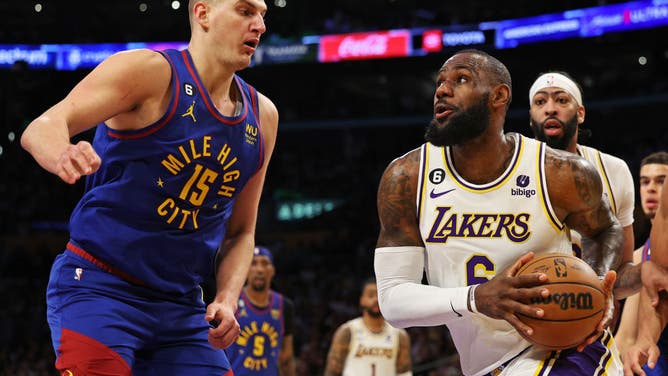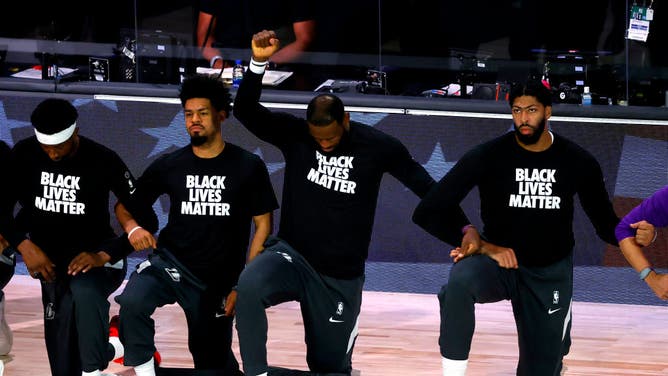The NBA Has No Leverage In Upcoming Media Negotiations | Bobby Burack
The National Basketball Association’s exclusive negotiating window with its two current media partners, Disney and Warner Bros. Discovery, expires on Monday. According to CNBC, people familiar with the matter expect the deadline to pass without a new deal.
The NBA would then be free to discuss agreements with other partners by next week.
Still, the news does not mean the NBA will depart ESPN/ABC and TNT. Both networks want to retain the NBA but in a smaller, cheaper capacity.
For example, ESPN/ABC carries NBA games on most Wednesdays, Saturdays, and Sundays after the football season. ESPN could give back one or two of those windows. Likewise, TNT could part ways with either its Tuesday or Thursday night packages.
The NBA hopes to triple the $24 billion it generated from its previous media rights deal, at around $2.6 billion per year. Translation: the NBA needs a third, and maybe a fourth partner.

LOS ANGELES - LeBron James of the Los Angeles Lakers drives to the basket against Nikola Jokic of the Denver Nuggets during the first quarter in game three of the Western Conference Finals at Crypto.com Arena on May 20, 2023. (Photo by Harry How/Getty Images)
Amazon, Apple, YouTube TV, NBCUniversal/Peacock and Netflix have all had preliminary conversations with the league expressing potential interest, adds CNBC.
Sources around the sports media industry tell OutKick that Amazon and NBC are the frontrunners for new NBA packages.
Specifically, NBC is interested in carrying the NBA on Sundays. NBC could also bid to split every other Finals with ABC, assuming the league would only entertain selling Finals rights to broadcast networks. (Note: TNT is a cable network.)
Amazon and NBC's Peacock are the most logical streaming destinations for the NBA, add sources. But don't rule out Netflix. Netflix recently announced a 10-year, $5 billion agreement to stream "WWE Raw" beginning in January 2025, officially entering the live sports business.
Now, to the part of the story that the NBA wishes you wouldn't read…

LAKE BUENA VISTA, Fla. - LeBron James of the Los Angeles Lakers kneels during the national anthem prior to the game against the Oklahoma City Thunder at HP Field House at ESPN Wide World Of Sports Complex on August 05, 2020 in Lake Buena Vista, Florida. (Photo by Kevin C. Cox/Getty Images)
The NBA is a valuable property. The question is how valuable. Disney and Warner Bros. Discovery want less NBA for a reason. The league has lost about half of its audience since 2012.
The NBA averaged just 1.56 million viewers across ABC, ESPN and TNT this past season.
"The NBA’s regular season, which ended this week, posted the lowest rated season in network TV history, dropping from last year’s disaster. Overall viewership on cable and network TV was down too," adds Clay Travis.
"LeBron and Adam Silver have destroyed the league."
Hard to argue.
Last June, the NBA Finals averaged just 11.64 million viewers.
Four of the five lowest-rated NBA Finals of the past 30 years have occurred in the past four years. (12.4 million viewers in 2022, 9.91 million viewers in 2021, and 7.45 million viewers in 2020.)
The NBA is political. Wokeness is a niche. The NBA is now more niche than mainstream, in terms of mass interest. Viewership of the NBA is closer to the NHL and Formula 1 than the NFL.
Heck, WWE is a more watched television product on a weekly basis than the NBA. (WWE is also better to watch live, in person.)
The NBA regular season has become increasingly meaningless. Star players skip games because they care so little about the outcome of said matchups.
NBA commissioner Adam Silver tried bribing players with financial incentives this year for a newly-introduced "Play-In Tournament." Silver had hoped to spike ratings with the tournament. He failed. The ratings were, to use a term, disappointing.
The NBA All-Star Game used to be a sought-after property. Not anymore. The league scored its second lowest-rated All-Star Game on record last February, topping only the season prior. The NBA has lost 80 percent of its All-Star Game viewership since the 1990s.
And then there are the players who star in the NBA.
No professional team sport in the U.S. depends more upon its top stars than the NBA. Players – not teams, rivalries, records, talent, or scores – draw the NBA ratings.
In 2014, during the NBA’s last negotiation period, ESPN and TNT signed up for a decade's worth of LeBron James, Steph Curry, and Kevin Durant. LeBron, Curry, and Durant are now in their mid-to-late 30s. LeBron turns 40 next year. Curry and Durant are no longer the top 10 players.
The NBA can only sell the latter stages of their careers to potential partners, this time around. The league must sell its new and upcoming stars, instead.
The question: who is the next face of the NBA?
We tried to find that answer earlier this year. We couldn't find anyone who fits the bill to be the guy, as in the post-LeBron face of the NBA.
Primarily, the most obvious candidates are foreign: Nikola Jokic, Luka Doncic, Giannis Antetokounmpo, Shai Gilgeous-Alexander, and Victor Wembanyama. Foreign players rarely transcend into mainstream popularity.
The top American-born players like Anthony Edwards, Jayson Tatum, and Jalen Brunson feel more like B-level superstars than the next LeBron or Michael Jordan.
"The NBA ratings are down severely," said Colin Cowherd last month. "I think it's because they don't have a face of the league [in place] and I'm not sure they have one on the horizon."
We concur.
Suffice it to say, the NBA had hoped to be in a better position than the one in which it finds itself headed into negotiations with potential media partners. Achieving its goal of $75 billion in media rights by 2025 will be challenging.
The NBA is not worth its asking price. The NBA is of decreasing value. Its two current partners admitted so by asking for less content at a reduced rate.
Buyers, beware.